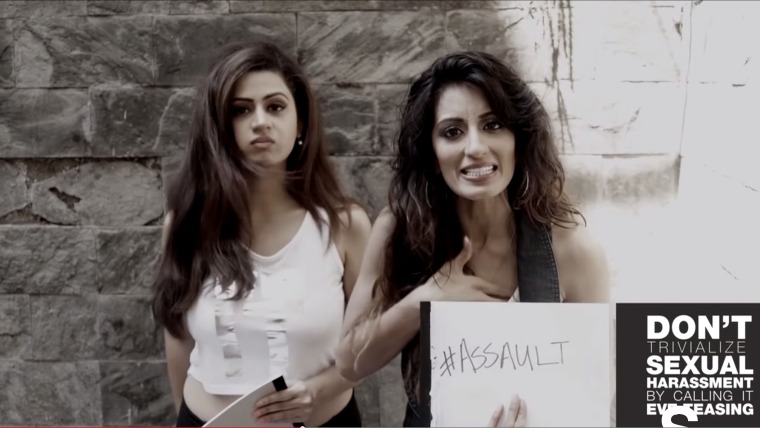“We're now known as the land of rapes. But did you ever wonder how this took shape?”
That’s just one of the lines from a provocative new rap video that’s making headlines around the world.
Mumbai-based rap duo BomBaebs, which includes artist Uppekha Jain and TV host Pankhuri Awasthi, released a spoken-word piece on YouTube last week called “Rap Against Rape,” and the video has already been viewed nearly 500,000 times as of Monday afternoon.
The video addresses Indian society at large, imploring men to change their behavior towards women, and imploring both men and women to change their attitudes about the role of women in Indian society. The pair also point out issues that contribute to misogyny in Indian society, such as victim-blaming, and strict social mores that police women's behavior and dress.
"If I walk alone at night, you say I'm irresponsible and lame, yet when I'm seen with a man, to my family I've brought shame?... I'm short, I'm fat, I'm tall, I'm skinny; I'll wear what I want - even if it's a mini. It's only a dress - don't think for a second it's a yes," the women say.
The video comes just weeks after the release of a BBC documentary, “India’s Daughter,” which chronicled the story of Jyoti Singh, a 23-year-old Indian woman and medical student who was brutally gang-raped and died of her injuries in 2012. The case generated worldwide outrage and demands from Indian citizens for the government to take action against rapes and enact laws to protect women.
In "India's Daughter," which was released in February of 2015, British filmmaker Leslie Udwin interviewed Mukesh Singh, one of the six men who were convicted in the Delhi gang rape case. Singh told Udwin that his victim was at fault for her rape, saying: "You can't clap with one hand. It takes two hands. A decent girl won't roam around at 9 o'clock at night. A girl is far more responsible for rape than a boy. Boy and girl are not equal. Housework and housekeeping is for girls, not roaming in discos and bars at night doing wrong things, wearing wrong clothes. About 20% of girls are good." His comments ignited a new wave of outrage in India and abroad, prompting the Indian government to ban the film from airing on network TV in India.
